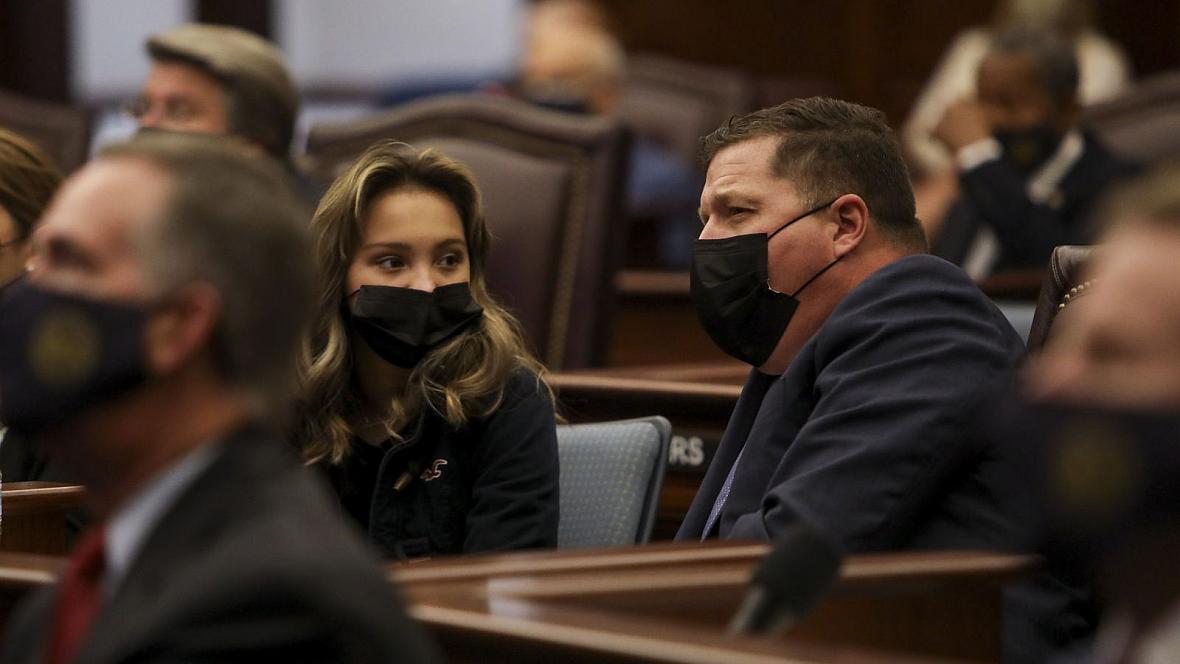Florida lawmakers take steps to limit school-data sharing
This story is part of a larger series by Neil Bedi and Kathleen McGrory, with support from the Fund for Journalism on Child Well-Being, a program of the USC Annenberg Center for Health Journalism’s 2020 National Fellowship.
Other stories in this series include:
Public interest groups take aim at Pasco sheriff’s data-driven policing programs
Pasco PTA: Use of school data to flag potential criminals ‘unacceptable’
Congressman urges probe of Pasco school data program
Bill aims to curb Florida’s data-driven policing programs
Pasco sheriff’s campaign paid $15,000 to top Sheriff’s Office staffer
Foundation cuts off Pasco schools, citing data sharing
Lawsuit: Pasco intelligence program violated citizens’ rights
DeSantis should consider removing Pasco sheriff, GOP congressman says

State Sen. Jeff Brandes, R-St. Petersburg, and his daughter listen to opening remarks on the first day of the 2021 legislative session.
[ IVY CEBALLO | Times ]
By Kirby Wilson and Kathleen McGrory
TALLAHASSEE — A Senate panel this week advanced a proposal that would require Florida school districts to obtain written consent from parents before releasing their children’s grades to law enforcement.
Sen. Jeff Brandes, R-St. Petersburg, said he introduced the measure in response to Tampa Bay Times reporting on a Pasco County program.
The Times found the Pasco school district shares student grades, attendance records and disciplinary histories with the Pasco Sheriff’s Office, which uses the data to determine which kids might become future criminals.
Brandes said parents were “up in arms” about the initiative.
“Parents should be notified before their (child’s) school grades are being used in this fashion and should have to affirmatively consent to that use,” he told the Senate Judiciary Committee on Tuesday.
Brandes recommended adding the language to Senate Bill 582, which would create a new chapter of Florida law called the “Parents’ Bill of Rights.”
The committee approved Brandes’ amendment, then advanced the bill by an 8-to-3 vote.
Sen. Audrey Gibson, a Jacksonville Democrat and the committee’s vice chairwoman, supported the amendment and voiced additional concerns about the Pasco program.
“There’s labeling happening along with the collection of the records that says that these particular kids have the potential for a life of crime or committing a crime, and that is just absurd,” she said.
Late last year, the Times revealed that Pasco Sheriff’s Office mines school-district data to build a list of schoolchildren it believes could “fall into a life of crime.”
An internal intelligence manual shows the agency considers factors such as whether students have received a D or an F on a report card or missed school three or more times in one quarter.
Neither the kids nor their parents are informed of the designation, the Sheriff’s Office told the Times.
The agency has said it uses the list to help deputies in schools offer mentoring and resources to students.
But top national experts have called the program a clear misuse of kids’ confidential data that is biased against children of color and children with disabilities.
Since the Times published its investigation, local parent and teacher groups have demanded reviews and changes to the program, and a U.S. congressman has called upon the Department of Education to investigate.
In addition, a national foundation that had given the Pasco school district $1.8 million for teacher training and instructional materials decided to cut off any additional funding, saying the data-sharing practices were contrary to its values and the best interests of children.
Brandes’ amendment does allow for such an exemption. In December, however, a digital privacy think tank wrote a legal analysis saying the Pasco Sheriff’s program violated the federal student privacy law.
The Pasco school district did not comment Friday.
State lawmakers have considered creating a Parents’ Bill of Rights before, but have never written the measure into law.
The latest version of the bill has several controversial provisions, including ones that say parents have the “right” to exempt their children from vaccine requirements and reproductive health instruction.
The bill also requires a parent’s permission before a health care provider can prescribe medicine or perform a procedure on a minor.
The language giving parents the right to consent to the release of their children’s grades is not included in the House version of the bill.
Asked this week if she planned to add the consent provision, the House sponsor, Rep. Erin Grall of Vero Beach, said: “Parents should always have input when their child’s records are accessed. But I haven’t looked into the issue.”
House Speaker Chris Sprowls, R-Palm Harbor, said the new language is unnecessary, adding that the Sheriff’s Office disputes the Times’ reporting that it asks for student grades.
Yet the agency told the Times last year it has access to a school district database that tracks if kids have low GPAs or are failing courses. And agency officials said in a Sept. 23 statement that “having the ability to see grades” helped them mentor students.
Lawmakers this session have proposed two other measures in response to the Times’ investigation into the Pasco Sheriff’s Office.
One would limit how police agencies in Florida can use data to identify and target people they consider likely to break the law in the future. The other would require the state to create standards for the practice.
[This article was originally published by Tampa Bay Times.]

